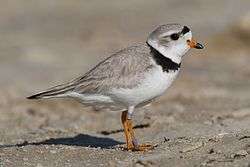Gruimorphae
Gruimorphae[1] is a clade of birds that contains the orders Charadriiformes (plovers, gulls, and allies) and Gruiformes (cranes and rails) identified in 2014 by genome analysis.[2] This grouping has had historical support,[3][4][5] as various charadriiform families such as the families Pedionomidae and Turnicidae were classified as gruiforms. The relationship between these birds is due to similar anatomical and behavioral characteristics. A morphological study went further to suggest that the gruiforms might be paraphyletic in respect to the shorebirds, with the rails being closely related to the buttonquails.[6][7]
| Gruimorphae | |
|---|---|
 | |
| Piping plover (Charadrius melodus) | |
 | |
| Water rail (Rallus aquaticus) | |
| Scientific classification | |
| Kingdom: | Animalia |
| Phylum: | Chordata |
| Class: | Aves |
| Infraclass: | Neognathae |
| Clade: | Neoaves |
| Clade: | Passerea |
| Clade: | Gruae |
| Clade: | Gruimorphae Bonaparte, 1854 |
| Orders | |
References
- "TiF Checklist: GRUAE I: Opisthocomiformes & Gruiformes". www.jboyd.net. Retrieved 10 April 2018.
- Jarvis, E.D.; et al. (2014). "Whole-genome analyses resolve early branches in the tree of life of modern birds". Science. 346 (6215): 1320–1331. doi:10.1126/science.1253451. PMC 4405904. PMID 25504713.
- Huxley T.H. On the classification of birds; and on the taxonomic value of the modifications of certain of the cranial bones observable in that class. Proceedings of the Zoological Society of London. 1867;1867:415–472.
- Lowe P.R. An anatomical review of the ‘waders’ (Telmatomorphæ), with special reference to the families, subfamilies, and genera within the suborders Limicolæ, Grui-Limicolæ and Lari-Limicolæ. Ibis. 1931b; 73: 712–771
- Lowe P.R. On the relations of the Gruimorphæ to the Charadriimorphæ and Rallimorphæ, with special reference to the taxonomic position of Rostratulidæ, Jacanidæ, and Burhinidæ. Ibis. 1931a; 73: 491–534
- LIVEZEY, BRADLEY C.; ZUSI, RICHARD L. (2007). "Higher-order phylogeny of modern birds (Theropoda, Aves: Neornithes) based on comparative anatomy. II. Analysis and discussion". Zoological Journal of the Linnean Society. 149 (1): 1–95. doi:10.1111/j.1096-3642.2006.00293.x. PMC 2517308. PMID 18784798.
- "Neognathia". www.helsinki.fi. Retrieved 10 April 2018.
This article is issued from Wikipedia. The text is licensed under Creative Commons - Attribution - Sharealike. Additional terms may apply for the media files.